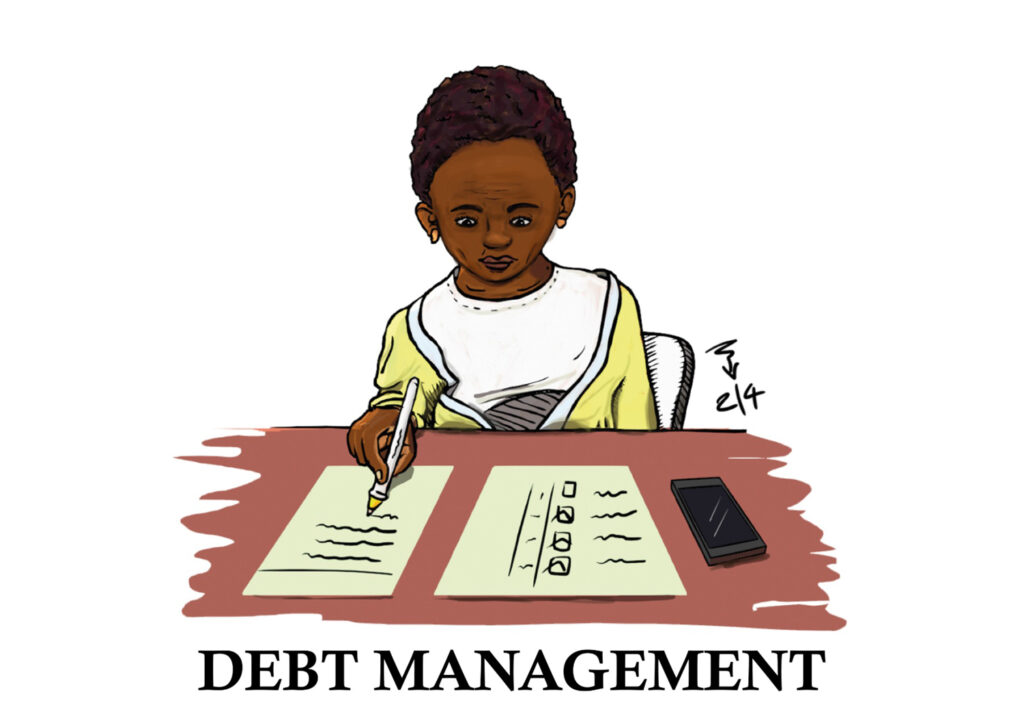By Tkay Nthebe
“Some debts are fun when you are acquiring them, but none are fun when you set about retiring them” Ogden Nash
Having made a lot of money mistakes growing up, I’ve learnt that if debt is not managed well, it can quickly spiral out of control. Much like me, a significant number of Basotho fall into the debt trap for many different reasons, leaving them highly indebted. The danger of high levels of debt is the constant financial distress many people live with, which leads to poor performance at work, deteriorating family relationships and general health issues that arise as a result of the financial burden.
As a point of departure, I’d like to clarify that not all debt is bad and if used correctly debt can improve the quality and standard of living. Examples of good debt is taking out a loan to buy income generating assets for example a green house, equipment, land, machinery and paying school fees for your children. Examples of bad debt would be using debt for consumption purposes such as using credit cards to buy monthly groceries.
In the last few years working as a Financial Educator, I’ve come to realise that some consumers of financial products acquire debt without fully understanding how it works and how it should be managed. In this article, I want to focus on two factors that are important when it comes to debt and managing it,
Know why you are acquiring debt
It is important to clearly define the reason you are applying for debt and to specify the exact amount you need. Why do you need the loan? What are you going to do with the money? Ausi Lerato needs LSL20,000.00 to pay for her tuition fees for example. When approaching the financial services provider (FSP) she is told that she actually qualifies for LSL 50,000.00 and she decides to take the entire LSL 50,000.00 The mistake many consumers like Ausi Lerato make is to take up such offers without fully defining what the additional LSL30,000.00 will be used for. This often leads to reckless spending where she cannot account for the LSL30,000.00, leaving her in unnecessary debt that could have been avoided.

Understand the cost of debt
Acquiring debt comes with a lot of costs for example the interest you pay on the loan, the administration fee and insurance costs (on certain loan types). Consumers often only focus on just the monthly instalment they will pay on the loan without understanding all the costs associated. Why is the interest rate important for example?
The interest rate is the annual percentage charged on loans by FSPs, which is usually based on the prime lending rate. The prime lending rate in Lesotho is currently 8.5% per annum. A higher interest rate for example, would result in the consumer paying a lot of money on the outstanding loan amount. It is therefore important for consumers to ask and understand how much interest they are charged on the loans they are taking.
If you find yourself struggling to manage the high levels of debt, I recommend that you speak to a qualified debt counsellor to come up with a debt repayment plan. There are a number of strategies available to help you get out of debt, so please do not suffer in silence. You can also speak to your FSPs for available solutions to help you get your debt under control.
“Somedebts are fun when you are acquiring them, but none are fun when you set about retiring them” Ogden Nash
Having made a lot of money mistakes growing up, I’ve learnt that if debt is not managed well, it can quickly spiral out of control. Much like me, a significant number of Basotho fall into the debt trap for many different reasons, leaving them highly indebted. The danger of high levels of debt is the constant financial distress many people live with, which leads to poor performance at work, deteriorating family relationships and general health issues that arise as a result of the financial burden.
As a point of departure, I’d like to clarify that not all debt is bad and if used correctly debt can improve the quality and standard of living. Examples of good debt is taking out a loan to buy income generating assets for example a green house, equipment, land, machinery and paying school fees for your children. Examples of bad debt would be using debt for consumption purposes such as using credit cards to buy monthly groceries.
In the last few years working as a Financial Educator, I’ve come to realise that some consumers of financial products acquire debt without fully understanding how it works and how it should be managed. In this article, I want to focus on two factors that are important when it comes to debt and managing it,
Know why you are acquiring debt
It is important to clearly define the reason you are applying for debt and to specify the exact amount you need. Why do you need the loan? What are you going to do with the money? Ausi Lerato needs LSL20,000.00 to pay for her tuition fees for example. When approaching the financial services provider (FSP) she is told that she actually qualifies for LSL 50,000.00 and she decides to take the entire LSL 50,000.00 The mistake many consumers like Ausi Lerato make is to take up such offers without fully defining what the additional LSL30,000.00 will be used for. This often leads to reckless spending where she cannot account for the LSL30,000.00, leaving her in unnecessary debt that could have been avoided.
Understand the cost of debt
Acquiring debt comes with a lot of costs for example the interest you pay on the loan, the administration fee and insurance costs (on certain loan types). Consumers often only focus on just the monthly instalment they will pay on the loan without understanding all the costs associated. Why is the interest rate important for example?
The interest rate is the annual percentage charged on loans by FSPs, which is usually based on the prime lending rate. The prime lending rate in Lesotho is currently 8.5% per annum. A higher interest rate for example, would result in the consumer paying a lot of money on the outstanding loan amount. It is therefore important for consumers to ask and understand how much interest they are charged on the loans they are taking.
If you find yourself struggling to manage the high levels of debt, I recommend that you speak to a qualified debt counsellor to come up with a debt repayment plan. There are a number of strategies available to help you get out of debt, so please do not suffer in silence. You can also speak to your FSPs for available solutions to help you get your debt under control.









